|
|
|
Sort Order |
|
|
|
Items / Page
|
|
|
|
|
|
|
| Srl | Item |
| 1 |
ID:
136675


|
|
|
|
|
| Summary/Abstract |
The 2014 general elections in India saw an increase of over a hundred million eligible voters as compared to 2009. This paper analyses the chord struck by the Narendra Modi-led Bharatiya Janata Party (BJP) with first-time voters. A survey in the Pilibhit district of Uttar Pradesh revealed that young voters, contrary to historical trends in the state did not consider caste or religious affiliations to be of substantive importance. Instead, they gave precedence to issues of corruption and development indicating a paradigm shift in thinking and a willingness to move beyond social divides and focus on economic concerns. The BJP emerged as the most popular party among participants as they felt it promised corruption-free developmental governance.
|
|
|
|
|
|
|
|
|
|
|
|
|
|
|
|
| 2 |
ID:
136791
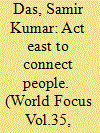

|
|
|
|
|
| Summary/Abstract |
As India marched into the new millennium with her renewed emphasis on what had come to be known as her 'Look East policy' being followed since the early 1990s, the Northeast appears to have been poised for a great leap forward. The region - being the key strategic node through which India can Look East farther towards the countries of Southeast Asia and eventually of East Asia - is no longer considered as 'a cul-de-sac leading nowhere', but as Verghese puts it, “a gateway to lands and opportunities beyond”.
|
|
|
|
|
|
|
|
|
|
|
|
|
|
|
|
| 3 |
ID:
136810


|
|
|
|
|
| Summary/Abstract |
India and Australia have overall traditionally shared cordial relations despite hitting rough weather during certain phases. With India’s efforts to look further east beyond her immediate south-eastern neighbors, and Australia’s desire to look further west beyond Japan and South Korea, have of late brought greater convergence in their interests.
|
|
|
|
|
|
|
|
|
|
|
|
|
|
|
|
| 4 |
ID:
135710
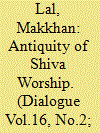

|
|
|
|
|
| Summary/Abstract |
India and China are not only the two oldest living civilizations in the world but still remain attached to their roots. Both the civilizations have seen, in the various stages of their existence, seven other Great Civilizations – Roman, Greek, Egyptian, Mesopotamian, Inca, Aztec and Maya – disappearing from the face of earth. By this simple fact one can understand the stability and all encompassing nature of both the civilizations – India and China. While the Chinese civilization continues from 1300 B.C. till date; the Indian civilization has continued with its ups and downs from 7th millennium B.C. – a time span of almost 9,000 years. Excavation of an Upper Palaeolithic shrine at the prehistoric site at Baghor, near Allahabad, and the similar shrine being in use today in the nearby village (see figs.1A and 1B) shows how the continuity, even in the shape of an abstract deity and the structure of shrine can survive almost over millennia.
|
|
|
|
|
|
|
|
|
|
|
|
|
|
|
|
| 5 |
ID:
135045
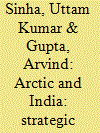

|
|
|
|
|
| Summary/Abstract |
A global temperature rise is being experienced earliest and most intensely in the Arctic region. The changes are worrying but the commercial interests are equally enticing. The Arctic is witnessing the convergence of the geophysical, the geo-economic and the geostrategic in strange and dramatic ways, making it a paradox and an antithesis. For India, the Arctic is distant when it comes to economic interests and near when it comes to climate change. As India today reassesses and rethinks its role in the new global geopolitical space, the Arctic becomes an important part of that reorientation and a movement towards a ‘global knowledge commons’. The Arctic is now an important geographical categorisation in India’s global policies. It must also be stressed that recent Arctic ascendancy in the policy domain stems directly from the strengthening of India’s climate change-linked economic and scientific positions in global world affairs.
|
|
|
|
|
|
|
|
|
|
|
|
|
|
|
|
| 6 |
ID:
136782
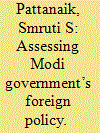

|
|
|
|
|
| Summary/Abstract |
‘Continuity’ has been a part of India’s foreign policy and a change in government can only bring in certain nuances in the conduct of that policy. The political environment that a new government brings in certainly creates some expectation from the government, but, any change in the foreign policy would be contingent upon a change in the strategic environment in which a state functions. Yet, the BJP led NDA government’s policy is keenly watched and there is an expectation that this government’s foreign policy would be different in style and direction, if not in substance.
|
|
|
|
|
|
|
|
|
|
|
|
|
|
|
|
| 7 |
ID:
136831
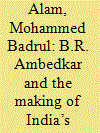

|
|
|
|
|
| Summary/Abstract |
B.R.Ambedkar occupies a special place in the development of constitutional democracy in Modern Asia. Born an untouchable he was sponsored by the progressive Maharaja of Baroda, India to improve his education. It was an assignment that the young Ambedkar accepted with gusto.
|
|
|
|
|
|
|
|
|
|
|
|
|
|
|
|
| 8 |
ID:
136833
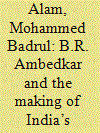

|
|
|
|
|
| Summary/Abstract |
B.R.Ambedkar occupies a special place in the development of constitutional democracy in Modern Asia. Born an untouchable he was sponsored by the progressive Maharaja of Baroda, India to improve his education. It was an assignment that the young Ambedkar accepted with gusto.
|
|
|
|
|
|
|
|
|
|
|
|
|
|
|
|
| 9 |
ID:
135648


|
|
|
|
|
| Summary/Abstract |
First it was Syria, now Iraq and the creation of a Caliphate incorporating parts of Syria and Iraq by ISIS (now simply IS) that will take the West’s eye further off Afghanistan a second time. Earlier, American President Barack Obama’s stunning political statement fixing the deadline for final troop withdrawal from Afghanistan as end-2016, not as widely believed, 2025, contingent upon the signing of the Bilateral Security Agreement was psychologically a negative development. Obama has outlined a new strategy for a new coalition of the willing that will attempt to roll back IS over the next three years. Precious resources will be diverted to fight the new war against the most extreme and violent form of terrorism that has attracted nearly 15,000 foreign Muslim youth.
|
|
|
|
|
|
|
|
|
|
|
|
|
|
|
|
| 10 |
ID:
135629
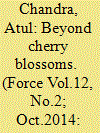

|
|
|
|
|
| Summary/Abstract |
The ShinMaywa deal could be a harbinger of what may prove to be an extremely fruitful relationship in the aerospace domain between India and Japan. India’s geography makes it ideal for sea plane operations, and especially for humanitarian relief operations, one can only imagine the impact of the US-2i in flood and cyclone relief operations.
|
|
|
|
|
|
|
|
|
|
|
|
|
|
|
|
| 11 |
ID:
137009
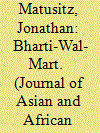

|
|
|
|
|
| Summary/Abstract |
This paper analyzes the experience of Bharti-Wal-Mart, a joint venture between Wal-Mart and Bharti Enterprises (an Indian telecommunications company), based on the principles of glocalization theory. By and large, glocalization refers to the adaptation of multinational corporations (MNCs) to local cultures. MNCs achieve this by immersing themselves into local cultures and by adopting unconventional marketing techniques. A major finding of this analysis is that globalization is not monolithic. It is not a homogenizing factor that forces local cultures to follow the norms, practices, and values of a big corporation. In fact, Wal-Mart executives quickly learned that imposing the Bentonville blueprint on local Indian populations would be doomed to failure from the beginning. An important focus of this analysis is to establish a framework for greater understanding of the strategies adopted by Wal-Mart in India.
|
|
|
|
|
|
|
|
|
|
|
|
|
|
|
|
| 12 |
ID:
136947


|
|
|
|
|
| Summary/Abstract |
To a great extent, popular representations of Indo–Australian relations have been viewed through the lens of CRICKET – the national game in both countries. Despite a proliferation of writing on colonial Indian CRICKET, Australia’s contribution to it has been largely ignored. In October 1935, a team of cricketers embarked on the first Australian tour to the subcontinent.1 The tour was conceived and FINANCED by the Maharaja of Patiala to assist preparation of an official Indian team to tour Britain in 1936. In this paper, I will draw upon primary sources and interviews to help articulate the complex colonial relationship between the East and the West, whilst locating the ambiguous position of Australia within this. Despite predominantly conforming to the Orientalist view that Westerners considered themselves a superior ‘race’, the Australian cricketers demonstrated an atypical cultural sensitivity to the Orient and the ‘Other’.
|
|
|
|
|
|
|
|
|
|
|
|
|
|
|
|
| 13 |
ID:
136317


|
|
|
|
|
| Summary/Abstract |
To secure its energy future, India urgently needs to design and implement innovative policies and mechanisms that promote increased use of abundant, sustainable, renewable resources. The present centralized model of power generation, transmission and distribution is growing more and more and more costly to maintain and, at the same time, restricts the flexibility required to meet growing energy demands.
|
|
|
|
|
|
|
|
|
|
|
|
|
|
|
|
| 14 |
ID:
135836


|
|
|
|
|
| Summary/Abstract |
In 2003, I published Shivaji: Hindu King in Islamic India, a book in which I reflected upon what I termed ‘unthinkable thoughts’. Such thoughts would be interpretive historical hypotheses that are so alien to popular cultural values that they become inconceivable, even when the evidence might point in their direction. In my case, once I expressed such thoughts, they produced not only a new eruption of defensive mechanisms to shore up the reputation of a venerated hero and all those values he symbolises, but also destabilised an historical discourse that had its own internal divisions. In Maharashtra, a small group of activists reacted to the unthinkable thoughts in my book and called for its ban, and the denunciation of that book became a hot button issue during India's national elections of 2004.
|
|
|
|
|
|
|
|
|
|
|
|
|
|
|
|
| 15 |
ID:
136824


|
|
|
|
|
| Summary/Abstract |
It has been more than six month of Modi’s government where his energy policies are already being tested both in terms of foreign policy dimension with increased energy engagements with the outside world as well as with his domestic energy policies, which were often criticised as ineffective during the previous regimes, despite some opportunities which came through, but was lost due to domestic bureaucratic and political hurdles. This is particularly with respect to Indo-US Nuclear Deal grabbed during United Progressive Alliance (UPA) I. This deal is yet to see a light of a day.
|
|
|
|
|
|
|
|
|
|
|
|
|
|
|
|
| 16 |
ID:
134496
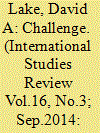

|
|
|
|
|
| Summary/Abstract |
Economic and political power within the international system is becoming more diffuse. Nonetheless, China is today the principal challenger to the United States (Mansfield, this issue). The European Union (EU) remains an economic powerhouse, but is currently plagued by problems centering on the euro and the austerity Germany and the fixed exchange rate regime have imposed on the continent. Europe has also shown little interest in challenging the United States in past decades and, in fact, has been a stalwart supporter of American hegemony for nearly 70 years. Japan remains the world's third largest economy and fourth largest trader, and after decades of stagnation may finally be on the road to economic recovery. Yet, it too remains a supporter of continued American leadership. Brazil, Russia, and India have garnered much attention recently but still rank low on the scale of economic power, whether measured by GDP or trade (Mukherji, this issue). China is the world's second largest economy and largest trader. By any measure, it is the only country likely to overtake the United States in the near future, although its ability to do so is not a foregone conclusion. The distribution of international power may soon return to bipolarity.
|
|
|
|
|
|
|
|
|
|
|
|
|
|
|
|
| 17 |
ID:
136587
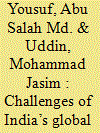

|
|
|
|
|
| Summary/Abstract |
India is emerging as a global economic power and expanding its military capabilities. Its maritime posture in the Indo-Pacific has made it an important stakeholder in the Asia-Pacific strategic ambiguity. The country is invited in almost all global forums and encouraged to play active role in the international affairs. These are some of the key indicators of India’s global emergence. By contrast, India is yet to take strong footholds in several global issues, while negotiating with international powers e.g. the USA and China. Some major challenges of the global emergence of India are its foreign policy predicaments, neighbourhood compulsions and China bogey, compulsions of energy import, limits of its soft power capabilities, internal security threats and domestic underdevelopment. In this context, the two important research questions of this paper are: which factors indicate India as an emerging global power? And, what are the challenges for India’s global emergence? The paper concludes that due to emerging economic and military power, India’s role in the international arena are increasing, but the country faces both internal and external challenges to project itself as a global power.
|
|
|
|
|
|
|
|
|
|
|
|
|
|
|
|
| 18 |
ID:
136525
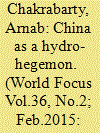

|
|
|
|
|
| Summary/Abstract |
China and India are both economic giants with immense need for energy. Water has become an important resource in the present world, and may become a reason for conflict. Currently China controls vast amount of water resources in Tibet (Tibetan Autonomous Region) and consequently the sources of the rivers that flow in India. The river Brahmaputra (known as Yarlung Tsangpo in Tibet) that drains India’s North East region is a great source of hydro-power and China eyes it for generating hydropower and to divert it for draining its arid northern region.
|
|
|
|
|
|
|
|
|
|
|
|
|
|
|
|
| 19 |
ID:
136283
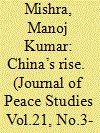

|
|
|
|
|
| Summary/Abstract |
China’s economic growth and military modernization has led to a serious debate in the international community as the weather China would remain an important stakeholder. While many scholars and political leaders in the US saw a threat in China’s rise, Chinese scholars have tried to portray China’s rise as peaceful rise.
|
|
|
|
|
|
|
|
|
|
|
|
|
|
|
|
| 20 |
ID:
136643
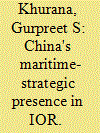

|
|
|
|
|
| Summary/Abstract |
Developments of the past few years clearly indicate China's quest to establish a permanent maritime-strategic presence in the Indian Ocean Region. With China fast emerging as a global super-power with the potential to challenge the primacy of the USA, this is accompanied with significant geopolitical, geoeconomic and security ramifications for the regional countries. This article attempts to examine the possible implications in terms of regional stability, regional balance of power, maritime security, maritime safety, economics and the adversarial potential in India–China relations. For an objective analysis, the study is based on two contrasting theories of international relations. When viewed in context of the Realist theory, China's presence in the region may lead to zero-sum outcomes. On the other hand, the premise of Constructivism could lead to “win-win” outcomes. The paper concludes that the outcomes are likely to lie somewhere between the aforesaid extremes, depending upon the actions of all states that have stakes in the region. It also attempts broadly to suggest the way ahead for all stakeholders in the region.
|
|
|
|
|
|
|
|
|
|
|
|
|
|
|
|
|
|
|
|
|